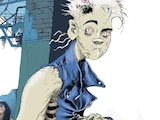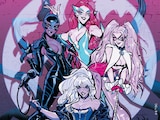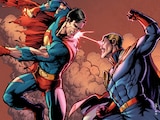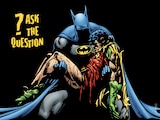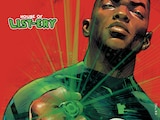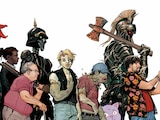Gotham City is a busy place, with a lot going down each and every week. In this monthly column, Joshua Lapin-Bertone helps you stay on top of it all by letting you know what you should be paying attention to within the Bat-Family…and why.
SPOILER ALERT: The below article contains spoilers for the season finale of Batman: Caped Crusader.
There are few things Batman hates more than firearms. The Dark Knight has a famous disdain for all guns, rejecting them as weapons of cowards. Most of this goes back to his childhood, where he watched his parents lose their lives in a flurry of bullets. However, even if Thomas and Martha Wayne had been killed some other way, I don’t think Bruce Wayne would feel any differently about guns. Above all else, Batman seeks to protect all lives, while guns are built to destroy them.
This is one of the reasons why the sight of the Dark Knight holding a gun is so jarring. Yet that is just what he does in the season finale of the excellent Batman: Caped Crusader. “Savage Night” contains a tragic moment where a mentally conflicted Harvey Dent is gunned down by a crooked cop named Arnold Flass. Enraged, Batman picks up a discarded gun and aims it at Flass. The sight is unsettling, especially for longtime fans of the Dark Knight. However, Batman’s humanity prevails. He fires a few shots purposely missing the cop, and then angrily throws the gun into the river.

After watching the episode, I began thinking of this version of Batman, which it should be noted is a 1940s-set superhero who only recently started wearing the cowl. Yes, Batman rejected the gun, but the fact that he almost gave in to temptation was very telling. Why did this version of Batman almost falter? Thinking about it, I realized it tied into one of the biggest themes of the season: losing humanity. Throughout Batman: Caped Crusader, many characters struggle with maintaining their humanity, and the Dark Knight is one of them.
One of the most telling examples is Harvey Dent. As the series progresses, we see the district attorney struggle to maintain his morality in the face of heavy corruption. Harvey falters a few times, but in the end, he dies a hero. Yes, he had a brief stint as the criminal Two-Face, but his Harvey persona won over, saving Barbara Gordon’s life at the cost of his own. Harvey fought for his humanity all season long, and he won.
Gotham City is also having its own struggle with humanity. Renee Montoya and Jim Gordon are struggling to run an honest police force, but corruption is baked within the department’s DNA. For every good cop, there are dozens of crooked ones. Public defender Barbara Gordon faces her own struggles throughout the series, fighting against a system that isn’t kind to those who want to do good.

Which brings us to Batman. Bruce Wayne’s struggle with humanity might fly under the radar, but it is a recurring thread in the show. There are small signs of it in various episodes, such as “The Killer Inside Me.” Seeking to get some information on Rupert Thorne, Bruce Wayne takes a recently scarred Harvey Dent out to dinner. Harvey isn’t ready for the dinner, and the outing mentally breaks him. Once the dust settles, Alfred chastises Batman for using his friend when he clearly wasn’t ready.
“Harvey Dent leaned on broken men all the time in court,” a dismissive Batman says. “He’d squeeze the small ones to get to the big fish. That’s all I was doing.”
It’s a startling attitude, but not nearly as shocking as Batman’s treatment of Alfred. While Bruce isn’t cruel to the beloved butler, there is a coldness to their relationship. He addresses the longtime family friend as simply “Pennyworth,” despite the fact that they’ve known one another since Bruce was a child.
Even Lucius Fox comments on their cold relationship. “I was raised to treat the staff like people, Bruce,” he says. “You might want to give it a try sometime.”

(Interestingly, Matt Reeves is one of the producers on this series, and the Bruce/Alfred relationship mirrors the one from his 2022 film The Batman.)
That isn’t to say that Batman is a cold and cruel person. Throughout the show, we see Bruce’s compassion shine through. One of the best examples is the episode “Nocturne.” The episode ends with Natalia realizing that she had killed her brother Anton. The young vampire girl is distraught, and in her depression she’s ready to stay out during sunrise, which would burn her skin.
Carrie Kelley, a young orphan Batman had saved, tells the Dark Knight to leave her. After all, Natalia had attacked innocent children. However, when Batman sees Natalia, he sees a child in pain. Batman wraps his cape around her, shielding her from the harmful sunlight. He silently comforts her as he carries her to safety. This is who Batman is.
But it’s not always easy for the hero to remember that. When Bruce is wielding a gun or being mean to Alfred, it’s because he’s struggling to hold on to his humanity. This version of Gotham is a rough place, and the longer you stay in it, the harder it is to hold on to your morality. It’s a message delivered with every new episode, as we see what the city does to people like Harvey, Harleen Quinzel and Basil Karlo. As Batman, Bruce Wayne is forced to confront the worst of his city night after night. Who could blame him for occasionally spending too much time staring in the abyss and losing sight of himself?

Alfred sums it up in the season finale. “Harvey Dent was twisted by ambition,” he says. “He lost sight of his own humanity. That isn’t you. You’re still inside there, Master Bruce.”
“Thank you, Pennywor—Alfred,” Bruce responds, addressing his butler by his first name for the first time.
In a place like Gotham, humanity may be hard to come by. Which is why when you find it, you can’t keep it at arm’s length.
Batman: Caped Crusader is now streaming on Prime Video.
Joshua Lapin-Bertone writes about TV, movies and comics for DC.com, is a regular contributor to the Couch Club and writes our monthly Batman column, "Gotham Gazette." Follow him on Twitter at @TBUJosh.
NOTE: The views and opinions expressed in this feature are solely those of Joshua Lapin-Bertone and do not necessarily reflect those of DC or Warner Bros. Discovery, nor should they be read as confirmation or denial of future DC plans.





